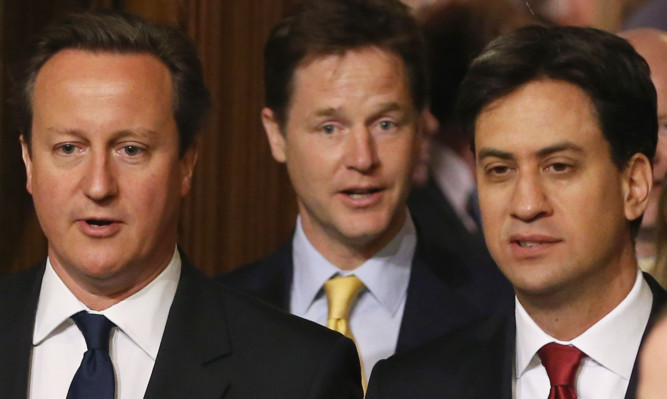
When Roy Hattersley missed an appointment to appear on the satirical TV show Have I Got News For You producers famously sat a tub of lard in his place.
With David Cameron now threatening to sit out any General Election debates the debate is over what to substitute for him. Simply an empty chair, one of his Tory team or, following the tub of lard, maybe something appropriate like a pair of scissors given the budget cuts he’s overseen, a Union Flag after his independence referendum win or a top hat from his Eton days?
Of course the PM might prefer to be replaced by a topper rather than let a minion like party chairman Grant Shapps go up against his leadership rivals.
On the face of it Cameron’s decision to try and wreck plans for election debates is an odd one. It was he who pushed for them to be instituted in 2010 and having happened it seemed unlikely they could be undone.
But two things have changed.
Last time Cameron was the challenger and the format of the debates meant they were always going to disadvantage the incumbent, particularly a control freak like Gordon Brown who was outside his comfort zone. Now Labour are led by someone many regard as just a freak. But Ed Miliband as the challenger is extremely keen the debates go ahead. He thinks he can make an impact.
He’s not a bad performer on his day but of five conference speeches he’s given as leader he’s delivered two that zinged and three that minged a worrying record for his team and forgetting the deficit during his last outing was a particular low point.
However expectations will be low. Short of swearing, insulting the Queen or punching a child on screen he is guaranteed to exceed most viewers expectations. With the polls so close, that could squeak him ahead of Cameron and the PM knows it.
The other change is that while Cameron was the challenger last time out no one predicted what an impact the outsider could have. Then it was Nick Clegg of whom most people had no expectations to exceed. When he performed well Cleggmania erupted.
What a long time ago that seems. Then Clegg inspired a mania, now he drives people manic. The outsider this time round will be Nigel Farage and everyone knows how dangerous the joker in the pack could prove.
Farage has nothing to lose so can play the populist card. His problems only start if the public call him and he actually ends up getting elected. Then he’d find out what it’s like to be a proper politician, and it probably wouldn’t suit him.
It’s media regulator Ofcom’s decision to grant Ukip “major party” status but not the Greens that’s given Cameron an excuse to say he won’t take part. He says he’ll only join in if the Greens are allowed to play too.
But what about the SNP? They have twice as many MPs as Ukip and the Greens combined. Certainly it would seem easier to call the whole thing off. But the broadcasters don’t want that and there was howls of protest it would be an affront to democracy.
The Ancient Greeks didn’t have telly but they invented democracy (or maybe they invented democracy because they didn’t have telly). Either way, all elections before 2010 weren’t democratically illegitimate because there were no TV debates.
The debates are fun but not vital.
Launching Labour’s election campaign last week Ed Miliband pledged his party would hold “four million conversations with voters”. He’s learned from last year’s referendum campaign.
What made that a carnival of democracy was not folk sitting at home watching debates on telly but voters getting involved. Maybe Cameron gets that, so he’s not keen on the debates.
Or maybe, to coin a phrase made famous by his predecessor and hero Margaret Thatcher, he’s frightened, frightened, frit.

Enjoy the convenience of having The Sunday Post delivered as a digital ePaper straight to your smartphone, tablet or computer.
Subscribe for only £5.49 a month and enjoy all the benefits of the printed paper as a digital replica.
Subscribe